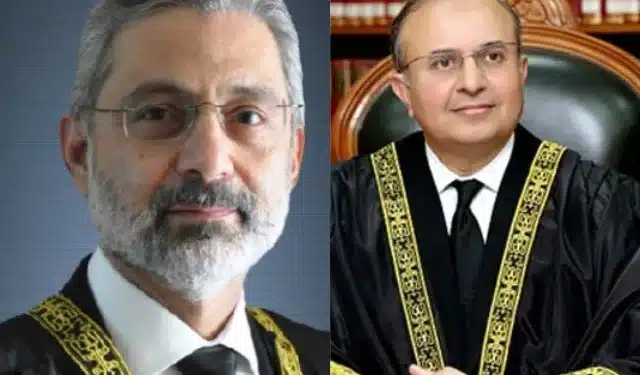CJP Isa gives 11 reasons for replacing Justice Akhtar.
Disrespecting senior ad hoc judges is one of reasons.
Justice Akhtar adjourns most of the cases, says letter.
ISLAMABAD: In response to senior puisne judge Justice Mansoor Ali Shah’s letter raising questions on removing Justice Munib Akhtar from the judges committee, Chief Justice of Pakistan (CJP) Qazi Faez Isa on Thursday gave 11 reasons to justify his action.
CJP Isa on September 20 appointed Justice Amin-Ud-Din Khan to the three-member judges’ committee, excluding Justice Munib Akhtar hours after the promulgation of the new Supreme Court (Practice and Procedure) Amendment Ordinance 2024.
The ordinance empowers the chief justice to nominate a judge in the committee that constitutes the benches. As per the ordinance, the body will comprise the chief justice, the most senior judge after the CJP and the judge nominated by Justice Isa.
In his letter, the CJP said legally he could not be asked about why he nominated a judge as the committee’s third member, however, “Since I have always advocated accountability and transparency I shall provide reasons why Justice Akhtar has been replaced.
“Let it be remembered that this I do because of your insistence, lest someone takes umbrage.”
He gave 11 reasons for his replacing Justice Akhtar from the body.
The chief justice said Justice Akhtar ardently opposed the Supreme Court (Practice and Procedure) Act, which had removed the dominance of the chief justice over the Supreme Court as well.
“He was one of two judges who availed the full summer vacations; indifferent to the piling backlog cases,” he said.
The letter mentioned that while on vacation and not available to do court work, Justice Akhtar insisted on participating in the committee meetings, suggesting his lack of trust in the next senior judge, Justice Yahya Afridi.
“The Act [also] stipulates that urgent cases are to be fixed within 14 days but this statutory provision and the constitutional right to seek review was negated by his [Munib Akhtar’s] refusal to hear urgent constitutional cases while he was vacationing.
“Disrespecting those who were his seniors (the ad hoc judges) and selecting 1,100 specific cases and confining them to hear only those cases, something wholly unprecedented,” it stated as additional reasons for removing the senior judge from the committee.
The letter mentioned Justice Akhtar’s not allowing ad hoc judges to be part of the Shariat Appellate Bench of the Supreme Court to hear the long pending cases as another reason behind the chief justice’s decision.
Giving further reason for his choice of cutting Justice Akhtar from the committee, CJP Isa mentioned the display of his rude and unreasonable behaviour towards a distinguished member of the committee and walking out of the meeting. The said committee comprised all the chief justices, senior puisne Judges, and distinguished members of the bar.
The apex court’s chief justice also said the bench headed by Justice Akhtar adjourned most of the cases and often finished its work before 11am; a concern expressed by his companion judges.
He also said the senior puisne issued a stay order in the audio leaks case and did not fix it for hearing.
In a letter written to the secretary of the Supreme Court on September 23, Justice Shah raised concern over the judges’ committee’s reconstitution and Justice Akhtar’s removal from the composition of the committee within hours of the promulgation of the ordinance.
Justice Mansoor, in his letter, noted that no reasons were given as to why the second senior-most judge, Justice Akhtar, was removed from the composition of the Committee. “Furthermore, no reasons were given why the next senior most judge was ignored and instead, the fourth senior most judge was nominated as a member of the Committee.
“Such unfortunate cherry picking and undemocratic display of one-man show are precisely what the Act tried to discourage and replace stance that was upheld by the Full Court Bench of this Court in Raja Amer,” he wrote.
Justice Mansoor also emphasised the importance of collegial decision-making within the judiciary, saying that “the principle of collegial working stands as a cornerstone for ensuring justice, fairness, and the larger good of the people who seek its intervention”.
“The concentration of ultimate administrative powers in the hands of a single individual, such as the Chief Justice. Runs counter to the ideals of democratic governance and judicial fairness,” he wrote, referencing the Supreme Court’s own ruling in the Raja Amer case.

